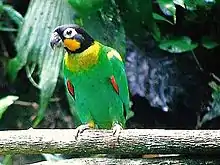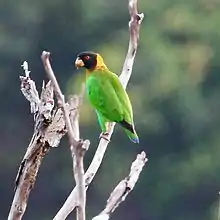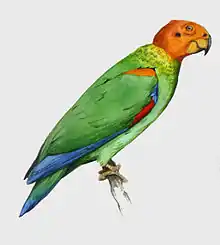Pyrilia
Pyrilia is a genus of parrots in the family Psittacidae. It was recently split from the now-monotypic Pionopsitta, and then briefly moved to Gypopsitta. But as Pyrilia was published a few months before Gypopsitta, the latter is a junior synonym.[1]
| Pyrilia | |
|---|---|
 | |
| Orange-cheeked parrot | |
| Scientific classification | |
| Kingdom: | Animalia |
| Phylum: | Chordata |
| Class: | Aves |
| Order: | Psittaciformes |
| Family: | Psittacidae |
| Genus: | Pyrilia Bonaparte, 1856 |
| Diversity | |
| 7 species | |
| Synonyms | |
|
Gypopsitta | |
All are relatively short-tailed parrots that are restricted to forests in the Neotropics. Their head or face contrasts clearly with the mainly green body, and they have a brownish or olive patch on the chest.
Species
| Image | Scientific name | Common Name | Distribution |
|---|---|---|---|
.jpg.webp) | Pyrilia haematotis | Brown-hooded parrot | southeastern Mexico to north-western Colombia. |
.jpg.webp) | Pyrilia pulchra | Rose-faced parrot | Colombia and Ecuador. |
_(8079746799).jpg.webp) | Pyrilia pyrilia[2] | Saffron-headed parrot | Colombia, Panama, Venezuela, and possibly Ecuador. |
 | Pyrilia barrabandi | Orange-cheeked parrot | south-central Amazon Basin in South America |
 | Pyrilia caica | Caica parrot | Brazil, French Guiana, Guyana, Suriname, and Venezuela. |
 |
Pyrilia aurantiocephala[3] | Bald parrot or orange-headed parrot, | east-central Amazon of Brazil |
| Pyrilia vulturina[4] | Vulturine parrot | eastern Amazon of Brazil | |
References
![]() Media related to Pyrilia at Wikimedia Commons
Media related to Pyrilia at Wikimedia Commons
- Use of Pyrilia over Gypospsitta Archived 2008-05-16 at the Wayback Machine. Richard C. Banks, February 2008, to the South American Classification Committee. Accessed 2008-06-22
- BirdLife International (2016). "Pyrilia pyrilia". IUCN Red List of Threatened Species. 2016: e.T22686125A93099249. doi:10.2305/IUCN.UK.2016-3.RLTS.T22686125A93099249.en. Retrieved 9 January 2020.
- "Bald Parrot (Pyrilia aurantiocephala) - BirdLife species factsheet".
- BirdLife International (2016). "Pyrilia vulturina". IUCN Red List of Threatened Species. 2016: e.T22686145A93099817. doi:10.2305/IUCN.UK.2016-3.RLTS.T22686145A93099817.en. Retrieved 9 January 2020.
This article is issued from Wikipedia. The text is licensed under Creative Commons - Attribution - Sharealike. Additional terms may apply for the media files.